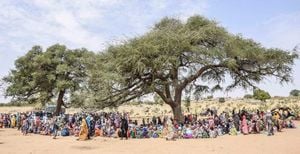India's relationship with Canada has found itself at the crossroads, marked by a series of unsettling tensions recently heightened by diplomatic spats and public confrontations. The latest chapter unfolded when Prime Minister Narendra Modi voiced his deep concerns following violent incidents aimed at Indian diplomats and institutions on Canadian soil.
During the International Day of Non-Violence event held earlier this month, PM Modi lauded the principles of non-violence but starkly condemned the intimidation faced by Indian diplomats. He termed such actions “cowardly” and “appalling”, emphasizing India's firm stance against violence and the need for mutual respect among nations. His comments were directed not only at the physical assaults on diplomats but also at the broader atmosphere of hostility aimed at Indian entities within Canada.
This outburst came on the heels of troubling episodes, including attacks on Indian temples and consular staff, which have recently stirred public outcry and Ministry of External Affairs (MEA) statements. Reports indicated serious disruptions to India’s consular operations in Canada, prompting the organization of diplomatic protests and discussions aimed at correcting the narrative around these incidents.
Earlier this month, the Indian government summoned the Canadian High Commissioner to India, Cameron MacKay, to formally voice its concerns over these deteriorative developments. The Indian administration expressed irritation over the perceived lack of action from Canadian authorities, who have withheld immediate responses to these incidents. Accompanying this summoning were significant grievances linked to the Canadian government's alleged leniency toward activities and groups viewed as hostile to India.
At the same time, there were conflicting narratives surfacing from Canada, with different factions reacting to these accusations. Speculation grew around Canadian officials' ties to groups advocating for Sikh separatism, known to raise issues related to India's historical turbulence. The Canadian government’s long-standing recognition of Sikh heritage and the voices for independence has, for many, established a grey area of diplomacy, where cultural acknowledgment sometimes feels at odds with international political responsibilities.
The diplomatic fallout reached new heights when the Indian government issued strong worded letters and statements characterizing the situation as deeply disappointing, starkly criticizing any form of support for groups labelled as extremists by New Delhi. These exchanges have underscored broader discussions about national sovereignty and the propriety of foreign interference or influence through domestic policies.
On the diplomatic stage, Canada has faced pressure from its identity as a multicultural country, which inadvertently may cause friction with nations such as India, who assert the sanctity of specific concerns, such as regional security and combating extremism. Prime Minister Trudeau’s government has been adamant about preserving Canada’s commitments to multiculturalism, but this might come at the expense of international relations, particularly with nations deeply invested in combating terrorism.
Meanwhile, amid the confrontation, bilateral trade and economic collaborations have raised questions on how issues of national security and domestic incidents influence commerce and cooperation. Leaders from both nations have acknowledged the need to navigate this nuanced terrain carefully, as economic ties are substantial, with India being one of Canada’s fastest-growing trading partners. The potential fallout has prompted both Indian and Canadian officials to seek avenues to stabilize their diplomatic engagements.
Prominent voices from the Indian community within Canada have also channeled their frustrations, openly criticizing both the Canadian government’s actions and the growing wave of anti-Indian sentiment stemming from certain dissident groups. They stress the importance of recognizing the nuanced nature of these incidents, urging for dialogue rather than discord, especially when the two nations share many common values and interests.
Despite these pressures, others within Canada have called for accountability and clarity, emphasizing the importance of addressing any wrongful actions against their sovereignty—a sentiment echoed by critics of both governments. These moments of anguish could serve as branching points for more intense conversations rather than tear down what little trust remains.
Back home, PM Modi’s administration appears resolute, responding to national outcry and affirming commitments to protecting Indian diplomats and citizens abroad. The assurance reflects the growing emphasis on safety and security, which many argue must take precedence over diplomatic niceties when addressing international relations.
Looking beyond the current turbulence, experts assert the importance of maintaining lines of communication open during this dispute, as shutting down dialogue may lead to increased misunderstandings. While both countries aim to solidify their stakes on the global platform, strategic patience may be needed to avoid long-term rifts. How both nations move forward with renewed dialogue will be pivotal, as changing the course of this relationship might redefine not just bilateral ties but also regional dynamics.
All eyes are now on upcoming negotiations as both countries stand to benefit from collaboration on cultural, economic, and security fronts. With public sentiment influencing diplomatic efforts significantly, it remains to be seen how PM Modi's administration will strategize their responses and whether Canadian leaders respond timely to rectify the strain. For now, the stakes are high, and every move made will be under close scrutiny by both domestic and international observers.



